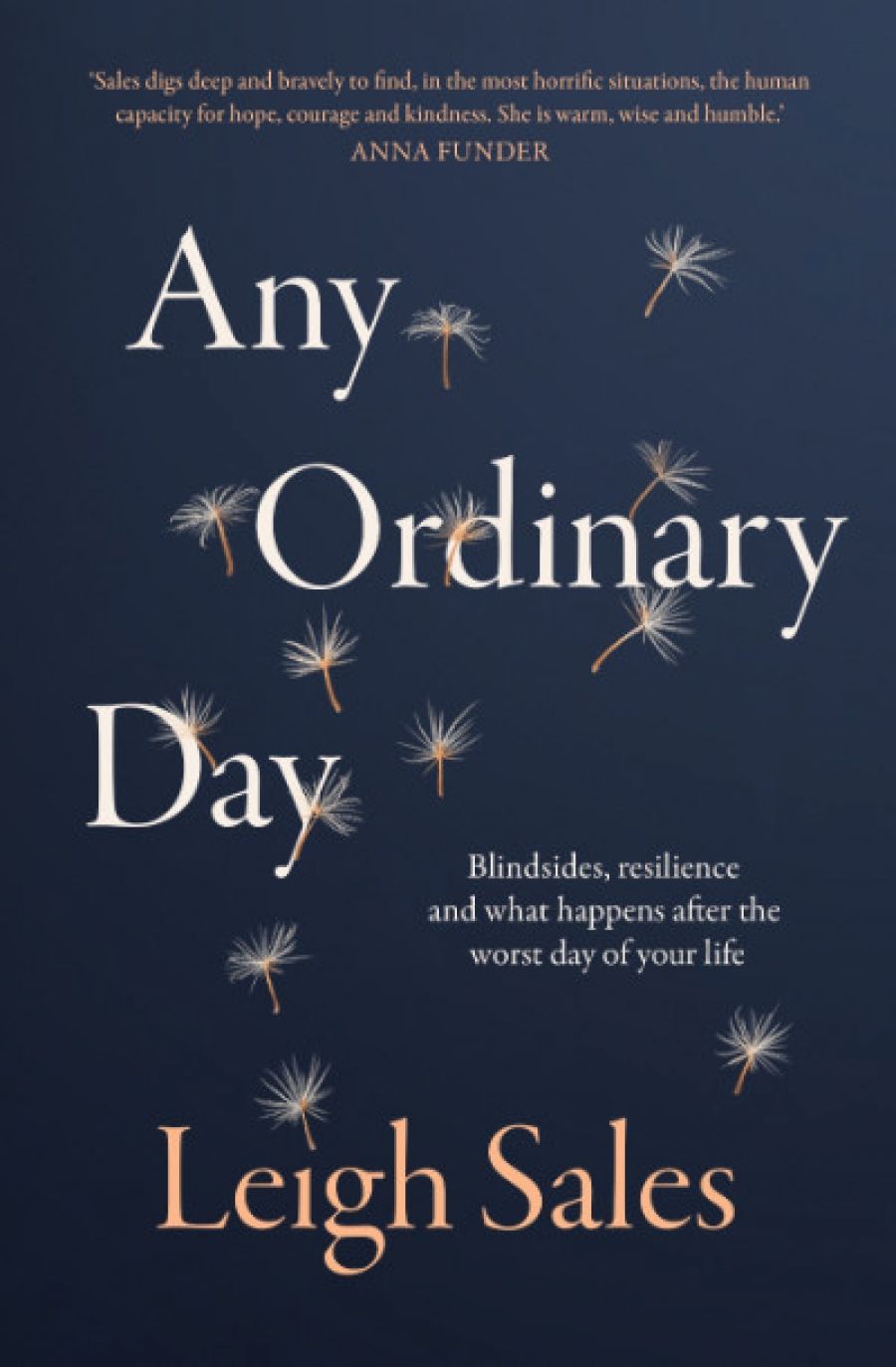
- Free Article: No
- Contents Category: Memoir
- Custom Article Title: Gail Bell reviews 'Any Ordinary Day' by Leigh Sales
- Custom Highlight Text:
Any Ordinary Day, Leigh Sales’s investigative report from the coalface of tragedy and resilience, is based on solid research and lengthy interviews. Sales, who wants to know the secrets of surviving outrageous fortune, has the journalistic chops to take on the quest. ‘I rely on a particular skill set …
- Book 1 Title: Any Ordinary Day
- Book 1 Biblio: Hamish Hamilton, $34.99 pb, 263 pp, 9780143789963
Each story in Sales’s third book begins with a glimpse into ‘an ordinary day’ in the life of someone to whom bad things will happen. To set the tone for what will follow, Sales chooses two instances from 2014 that are still resonant in the public psyche: cricketer Phillip Hughes padding up for a Sheffield Shield match at Sydney Cricket Ground; and Katrina Dawson leaving her law office mid-morning for a hot chocolate at the Lindt Café. Hughes will die in hospital two days later as the result of a blow to the neck; Dawson will be killed in the gunfire that ended the Lindt Café siege sixteen hours after it began.
Sales then steps into the narrative with her own ‘ordinary day’ story from 2014: a medical crisis that threatened her own life and that of her unborn child. ‘Blindsided’ by the experience, she asks: ‘When the unthinkable happens, what comes next? How does a person go on?’ These are questions that invoke Camus’s ungovernable universe and set the narrative in motion. Shoulders squared, reporter’s toolbox open, Sales begins. A foreshadowing of her approach can be found in her previous book, On Doubt (2009). Her well-argued thesis, partisan only in its determination to hold on to her own ‘old-fashioned’ journalistic principles, is preceded by a hectic introductory chapter on growing up in Queensland where her inconvenient questions and backchat set up frequent clashes with her regimental sergeant-major father. Sales, we learn, is no slouch when it comes to interjecting.
After some neatly summarised science on trauma, grief, adaptation, and the current thinking on evolutionary biology, Sales grows impatient with theory and yearns to start a conversation. Her inner journalist wants access to the horse’s mouth, not the riding manual.
Sales is a good interviewer, and these chapters have the authentic ring of unrehearsed revelation.Yet almost immediately, the interviewer is photo-bombing the moment. ‘I’m so sorry to cry, I’m a terrible sook,’ she says to Michael Spence, vice-chancellor of the University of Sydney, who lost his wife to cancer in 2012, leaving him widowed with five children. The scene is both endearing and slightly jarring. What is the reader to make of these interjections?
Later, she meets Stuart Diver, sole survivor of the 1997 Thredbo landslide in which his first wife drowned. In 2015 his second wife died from breast cancer. Diver acknowledges the public perception that he is jinxed, rejects it, yet still has doubts about ever marrying again, even though each wife died in tragic circumstances. Before the reader can process this information, Sales jumps into the narrative: ‘You might be thinking, Hang on, I still reckon losing two wives by the age of forty-four is pretty weird’, followed by an analysis of the two deaths. She concludes that Diver himself is statistically more likely to die before any hypothetical third wife.
Jumping into the narrative is a recurring pattern as the book gathers momentum. ‘Let me just break into Hannah’s story here to tell you what it’s like to sit across from her and hear this,’ Sales writes of the author Hannah Richell, whose husband Matthew died in a surfing accident in 2014. Didactic nods to the reader like, ‘As the last chapter explained’, or ‘Get it?’ while explaining a joke about a police officer’s name – along with bracketed asides like ‘(while I’m thinking, Wow, big call to go to homicide!)’ – might be endearing to Sales’s fans, and not out of character to her podcast listeners, but the overall effect in a book tackling a serious subject can be disorienting. Any Ordinary Day sits between stools: neither straight memoir, though rich in digressions into private aspects of her life, nor the focused reportage of a Walkley Award–winning broadcast interviewer. The conversational style, like stand-up comedy, works best when the audience is sitting comfortably in their seats.
 In the last third of the book, Sales hits her straps. Her interviews with Richell and forensic counsellor Wendy Liu are stand-out pieces worthy of close study. Sales is still interjecting, but by then the reader either forgives her and goes with the flow, or ignores the asides and focuses on the wisdom on the page.
In the last third of the book, Sales hits her straps. Her interviews with Richell and forensic counsellor Wendy Liu are stand-out pieces worthy of close study. Sales is still interjecting, but by then the reader either forgives her and goes with the flow, or ignores the asides and focuses on the wisdom on the page.
For a book that wears its heart on its sleeve, there is plenty to admire. The main questions are answered. Sales, known for her trademark verve, disarms her audience with glimpses of her off-screen nerves behind the studio curtain, and delivers, surprisingly, a happy ending. ‘You will be okay,’ she writes – the self-empowering mantra one might hear, perhaps, from a woman of a certain age entertaining doubts.


Comments powered by CComment